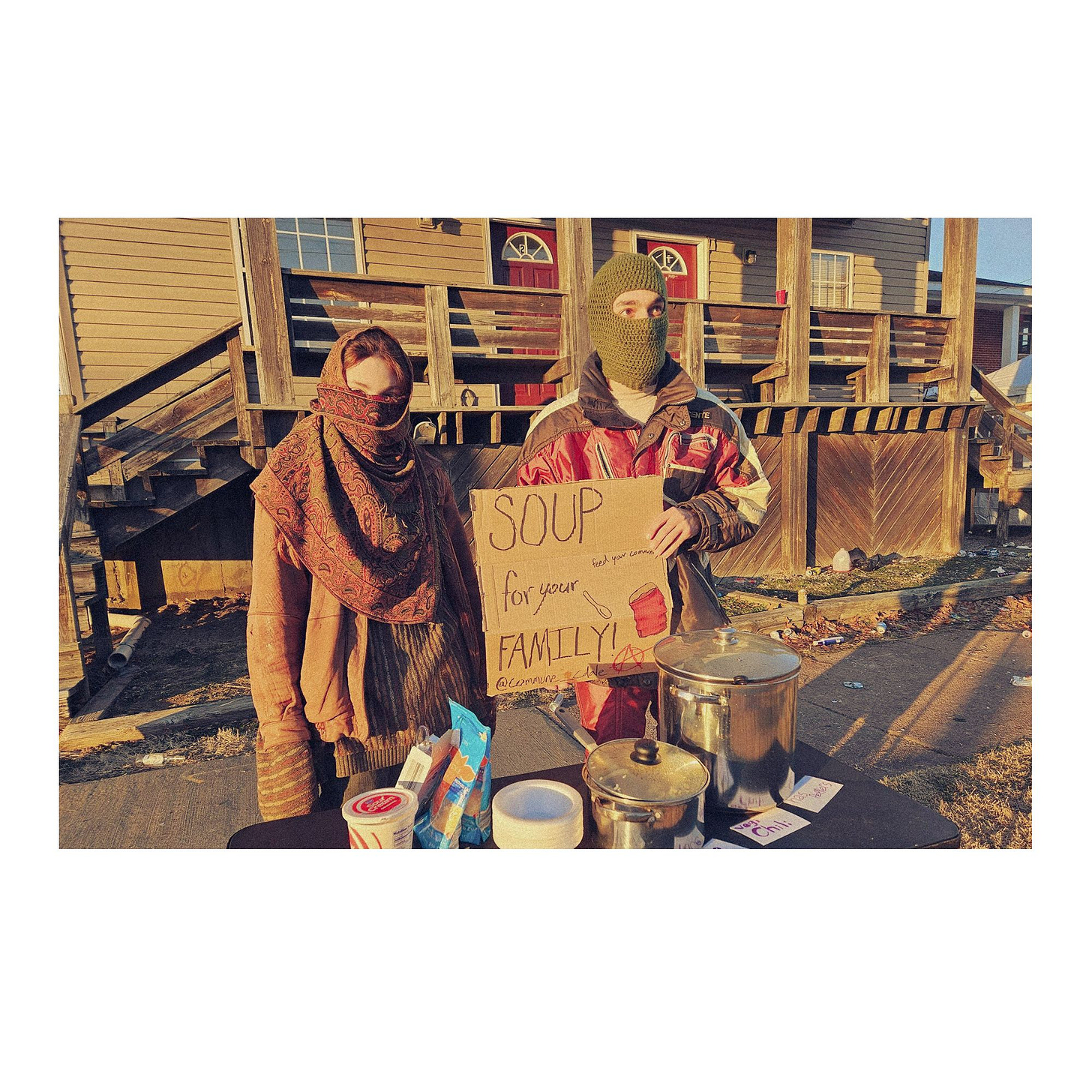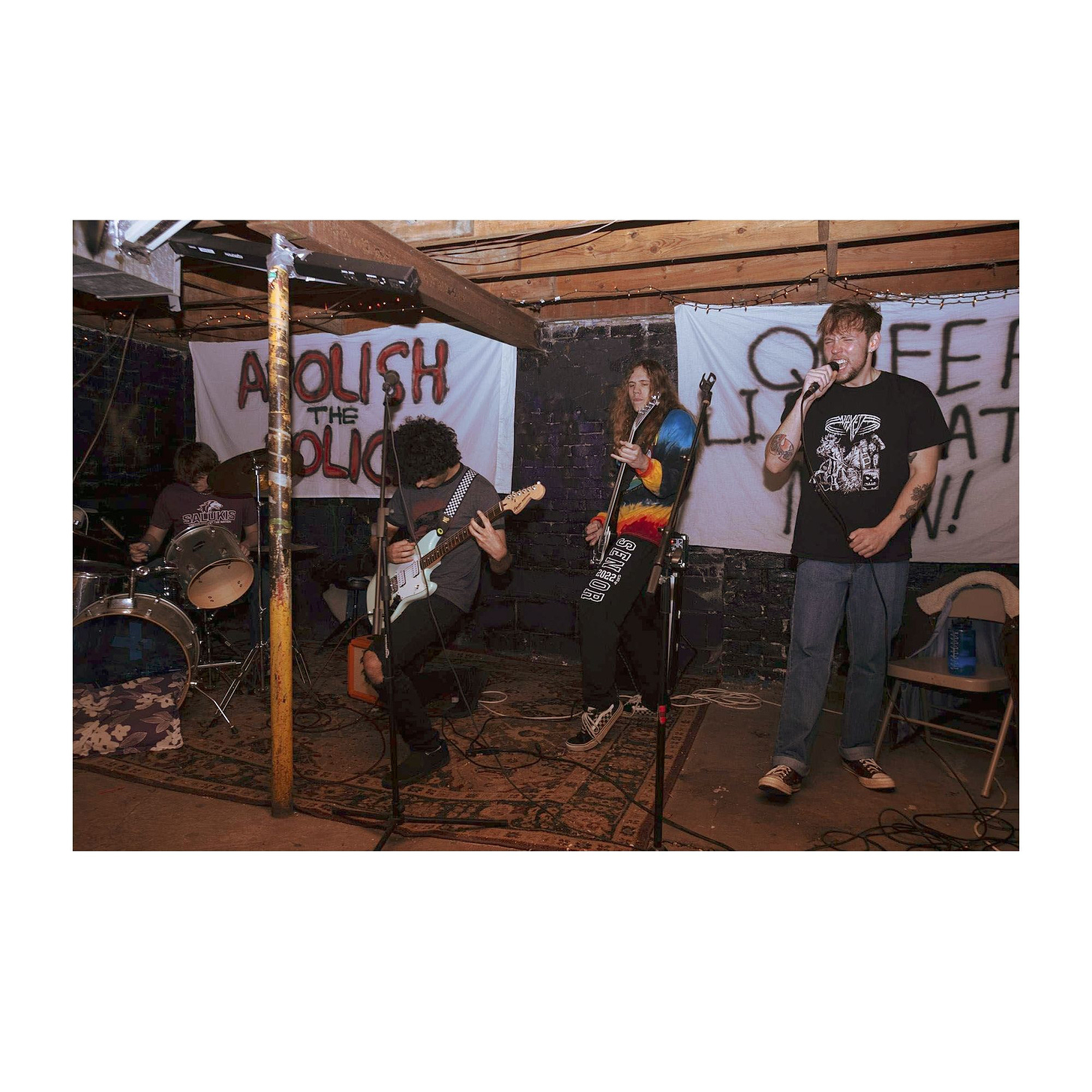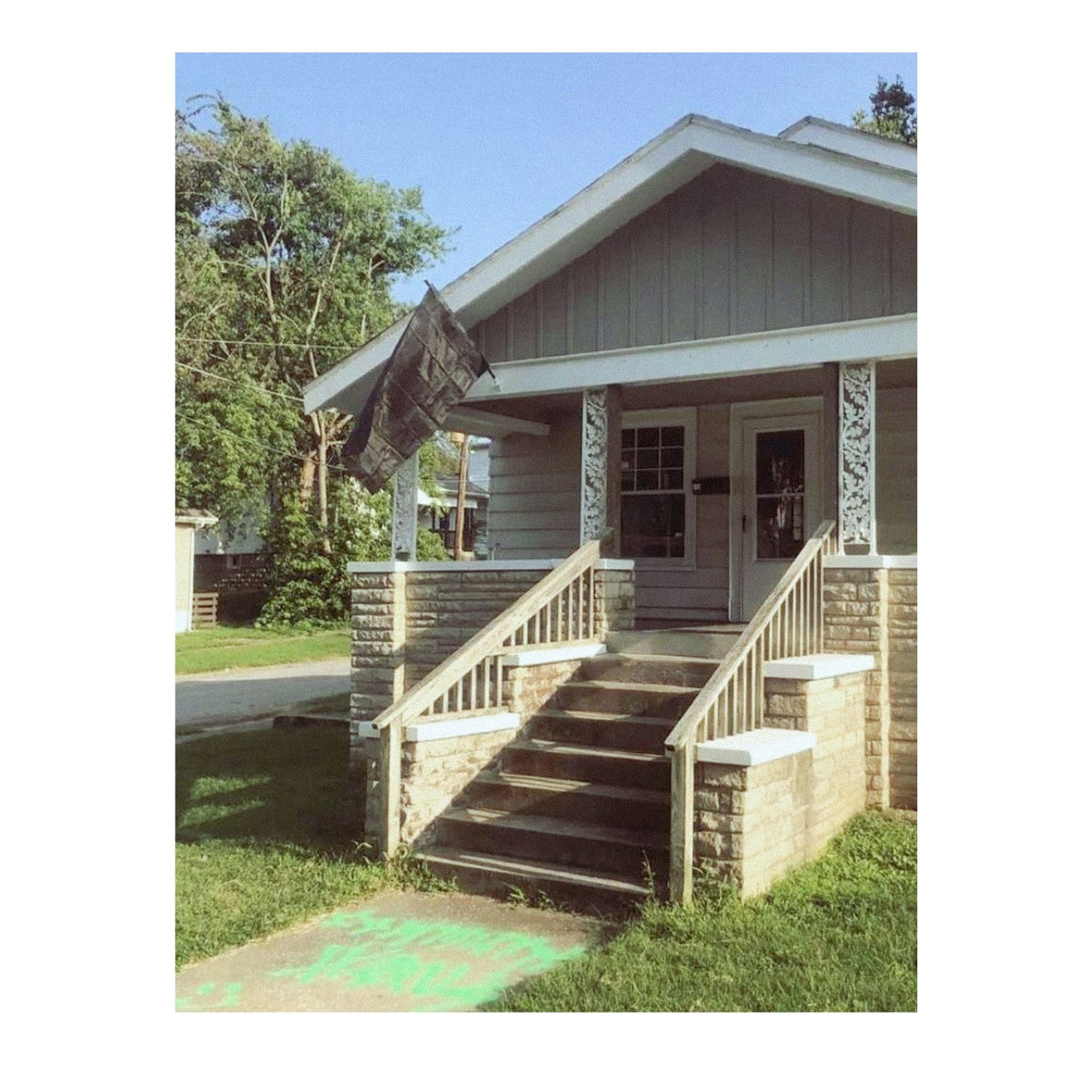Deep in southern Illinois, in a small town called Carbondale, a group of joyous anarchists, punks, queers, and friends have moved in together and declared The Commune, a form of life in common taking a stand against the end of the world. Their projects seem to us to provide a beautiful example of the forms of partisanship capable of interrupting both the slow violence of ecosystemic collapse and the much quicker violence against queer and trans people that has become more and more common today.
1) Tell us a bit about the Commune.
The Commune is a rented house in the punk neighborhood of Carbondale, IL that we use as a DIY autonomous organizing and music venue. In Carbondale there is a history dating back to the 80’s of basement shows and party houses in the neighborhood closest to the university. Many of us who founded Commune come from this punk culture in this neighborhood, and wanted to make a critical intervention into the subculture of punk here to link art and politics closer together. Since our inception in August of 2023 we’ve hosted regular punk and music shows, art and craft nights, movie nights, report backs from actions and gatherings, and monthly community dinners. We just did our first reading group, have started making raised garden beds and a community compost box, and have hosted a number of events in solidarity with the Stop Cop City movement. In the future we hope to do more political education, mutual aid, skill shares, boxing lessons, and more regular meetings for organizing. We also now serve a large soup for every show and usually will bring it out to other house shows and events when we have leftovers. We also hope more people in Carbondale will use our spaces for their own events, meetings, and artful happenings. Currently, most people interact with Commune as a punk house, a raucous party space with live music and lots of partying. We hope that this serves as an entry point for others to become interested in and learn more about the struggle. However, it would seem our biggest hurdle going forward will be attempting to figure out how a party can become the process of building the Party.
2) How did y’all first find one another?
Some of us involved in this project come from older struggles and older spaces in Carbondale’s history, specifically the Flyover Social Center, a squatted anarchist social center, and the Carbondale Spring a municipalist campaign to defund the police in Carbondale that was born out of the Flyover Social Center. The Flyover Social Center was evicted in late 2021 and the Carbondale Spring has mainly become disarticulated and co-opted by the city government. It however survives on in the Carbondale Spring Food Autonomy project which runs several gardens, a food forest, and helped build chicken coops for neighbors during the covid pandemic. After the eviction of the social center there was a long road back to anarchist organizing in Carbondale. We needed time to heal, time to mourn, and time to regroup. While some of us come from these past projects, most of us who live at Commune met each other after this period of time. We all came here for the university and met through more traditionalist leftist organizing such as the DSA. We bonded through our solidarity with the stop cop city movement, going to punk shows, and distroing literature at every show we went to. In that process of building shared trust and strategy we dreamed of starting our own punk house that could double as a political space. The university will continue to bring in a mass of young people every semester and the most politically anarchist will be funneled into the punk subculture. We all came here originally for the university and were brought into the struggle through spaces like the Commune. We hope to grow with the next generation of young radicals who come to Carbondale for school, for the cheap rent, or to flee increasingly fascist red states.
3) What’s life in Carbondale like?
Carbondale, IL is a small liberal university town of about 20,000 in the dead center of Southern Illinois. It’s bordered to the west by the increasingly wealthy metro St. Louis area, to the east by dying coal towns, to the north by conservative farm country, and to the south by the beginnings of the Bible Belt and Appalachia. We are a liberal stronghold in a sea of red. That said, Carbondale is a small, but very welcoming, liberal and diverse town. We have blue state minimum wage but red state rents, making it very cheap to live in Carbondale despite the lack of good jobs outside the university. Carbondale over the last 20 years has shrunk mainly due to the local government’s repression of the party culture, and the increased taxes in Illinois that have driven many people out of the state. The budget crisis under Rauner that saw money frozen for public universities hit Southern Illinois University harder than others. With the crisis came a new chancellor who downsized the university. Over the last 20 years 10,000 people have moved away and there are 10,000 less students enrolled each year which has led many to believe that Carbondale is dying like many other cities across Illinois and the country. Despite these crises, Carbondale, just like America, keeps trucking on. Depopulation has made Carbondale feel like a ghost town, empty and less alive than in previous years. This also makes it really hard for Carbondale to be gentrified, as outside capital is increasingly scared to invest here. The town’s “spaciousness” has its drawbacks and its advantages. Rent and houses are cheap here, but it’s also hard to imagine the riotous Carbondale ever coming back in this ghost town.
Beyond the broader political situation around Illinois, Carbondale is a sweet, very loving small community. The city is very bikeable and walkable with many beautiful community gardens and green spaces. Carbondale is host to a very large queer and trans community that grows every year with new students who want to flee their parents and home states for liberal areas. Carbondale still retains a small town, rural vibe that many of us fleeing those things grew up in. The town is also getting more resources for reproductive and gender affirming care. Bar culture and partying is a big culture here and can come with its toxic and harmful aspects, especially from the frats.
Carbondale and Southern Illinois as a whole have a long radical history. From the radical coal miner unions of the 1910s and 20s to the Black Panthers who ran spaces in the late 60s in Carbondale. In 1970 student riots after the Kent State massacre brought the city under National Guard and State police occupation before the students brought the semester to an early end. This radical history was disarticulated into party riots until the early 2000’s, though there have always been anarchists struggling for a life worth living in Carbondale.
4) There has been some reporting on Carbondale as a frontline in the conflict over bodily autonomy since the Dobbs decision. Could you speak to that?
After the end of Roe, one large abortion clinic from Memphis and two smaller abortion practitioners moved to Carbondale and set up shop. A Planned Parenthood is now also being opened in Carbondale. With the rolling back of reproductive rights Carbondale has become the nearest place to get reproductive healthcare for millions of people across the south. With bans on gender affirming care across the south it’s also becoming one of the closest and cheapest places for trans and queer people to seek refuge from increasingly regressive policies throughout the country. This has placed Carbondale firmly on the frontline in a growing conflict across America over autonomy over the body. Meaning that Carbondale will increasingly grow to cater to people who need these resources and most likely will become a place of refuge for trans people and families with trans youth. The last city council election also brought in one of the most diverse city councils, electing three black women and a trans woman, the first trans city council person in the state of Illinois. This has focused a lot of attention from the outside mainstream media on Carbondale and while early reporting highlighted the conservative backlash against the clinics, the first openly transgender city council person and more clinics coming has also revealed a different view of Carbondale and its strengths.
Many queer and trans refugees have already moved to Carbondale and more will come with this attention from the media and growing threats to queer peoples’ safety in the south. The Commune is made up of a few of these trans refugees.
5) Why is this haven necessary?
All of the states around us are increasingly becoming hostile to queer life and joy. We know queer life, joy, and struggle will continue in these places and they must, but as states pass more and more evil laws it will be harder for many trans people to live there. The threat of violence against our visible queer lives will grow with each law passed and each speech given that calls for our eradication. There are many young people trapped in awful, homophobic families that suppress and attack their ability to be free. Cities and spaces need to be pried away from capital and empire in order to make room for safety and security for queers, but also to create places for queer life and love to flourish. We need places where Queerness is synonymous with dangerousness. Places where queer life is defended tooth and nail, but also where queerness grounds attack against that which kills queer life. This haven is necessary for queer life not only to survive but also to flourish. We plan to continue to do all we can to safeguard this haven in Carbondale as well as standing in material solidarity with comrades in the south and supporting their struggles for liberation where they live.
6) Are folks in Carbondale supportive? Has there been conflict with right wingers or others?
Carbondale is a strangely anarchic place. It is not uncommon to run into an old street fighter from the days of May 68 or a random anarchist not known to any of our comrades. Famously, a politician once declared Carbondale a “den of Communists and Witches.” This is all to say that the city is full of radicals and liberals. There is a conservative core to the area and the city, but the city is very queer friendly and no stranger to political radicals across the left. So, yes, Carbondale has been very supportive of our project.
The Commune itself has mainly found itself in conflict with the police with them being called on us four times now. The first two times because of tits being out on the porch (our neighbors do not always appreciate our queerness). The third a noise complaint during a show which is not an uncommon occurrence for punk shows in the neighborhood. A march was also led from Commune on Halloween night playing on the old tradition of students taking over the strip and trashing it. Instead of like in the past, when Halloween gathered 10,000 of the hardest party rioters from across the midwest, this time 30 punks and students marched down the strip, declaring “Halloween Lives!” The police mobilized massively to crush our march since the threat of any type of return to rowdy Halloweens is a deeply ontological threat to them. It would mark a return to the decades when police failed to control Halloween riots. The police parked their vehicles and pursued the march on foot, threatening arrest and declaring they knew where we lived. This is pretty unheard of behavior from the Carbondale Police. Generally a small protest that takes the commercial strip is left alone. The march occurring on Halloween is no doubt the reason for their aggression. Since then we haven’t had any more conflict with the police and let’s hope it remains that way for now.
Despite Carbondale being a small dot of blue in a sea of red, right wingers rarely enter Carbondale to contest the political terrain. It’s very hostile to them. Donald Trump visited nearby Murphysboro in 2018 to stump for Mike Bost’s reelection and he never left the airport, probably for fear of entering into more hostile territory in Carbondale. Patriot Front and some local proud boys followed Trump to the area with Patriot Front, impotently leaving their business card at the Flyover. At the end of 2020 a Trump caravan came through Carbondale, and people responded with one of the town’s largest anti-fascist actions that saw protesters vandalize and steal flags off trucks and several confrontations with state police. At one point, the caravan was halted and turned around. Proud boys were seen at a spattering of BLM protests in smaller cities around Southern Illinois, but clearly lacked any sort of centralized organizing among each other. With the coming of the abortion clinics a church outside of Carbondale and many others from outside Carbondale mobilized aganist the clinics. They mainly engaged with city hall and found a city council that was pro the clinics. There was a day of protests in Carbondale aganist the clinic and every day there is a paid pro-life protester standing next to the Freddy’s 50 yards from the clinic itself due to an ordinance passed by the city. This is to say that the protests aganist the clinic have been mild compared to what one might expect given Carbondale’s location.
No doubt there are fascists laying in wait all across Southern Illinois, but for now they seem isolated and disorganized. We aim to keep it that way.
7) How can folks find you?
You can email us at commune_cdale@proton.me and find us on Instagram, Twitter and TikTok at @commune_cdale. We’re always looking for pen pals from other spaces, comrades, and art exchanges; hit us up, and come visit!
This text has been syndicated from Inhabit: Territories.



